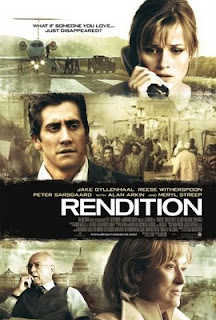I love movies that make me think. I love movies that critique culture. I love movies that have a purpose or a message whether it is right or wrong. I love movies that allow me to discuss ideas with both believers and unbelievers. I'll admit: quite often it is very nice to insert styrophome into my DVD player and allow my brain cells to veg with Meg Ryan or some other mindless chick-flick. However, the movies I find myself wanting to see again or recommend to others are ones that challenge me.
I recently saw the movie "Rendition" with Reece Witherspoon, Meryl Streep, and Jake Gyllenhaal. The movie is about the ethics of torture and the way the American government responds to this controversy. I was doubtful the movie would accomplish anything more than making me sick to my stomach but, in the end, I was very surprised by the way they tastefully got their message across.
During the
What an ethical dilemma this creates! It is so tempting to think, “Well, they would do it to us!” or, “It will save thousands of lives!” My biggest concern with this line of reasoning is that it adopts the utilitarian axiom that it is better to sacrifice the one for the many. With this mindset, we would also have to affirm that it is morally permissible to conduct stem cell research on a few to save the masses. Furthermore, scripture, unlike the Qu’ran, makes no provision for torture of any kind. It certainly does support capital punishment for crimes that have been committed and deserve death. Scripture is also clear that our treatment of enemies should be no less guided by the principle of “neighbor love.” (The Good Samaritan parable)
From an ideological standpoint, it is important that the means used to protect human life must not encourage contempt of human life at the same time. While there is a place for “just war” and capital punishment, the main goal of supporting human life as creatures formulated in the Image of God must be kept in perspective. Of course, prisons should not be Day Spas and interrogators shouldn’t sound like Oprah. After all, protection of innocent life is a major factor in “neighbor love.” However, a proper perspective is in order before such activities are adopted.
Whether or not you agree or disagree with the movie’s anti-torture message, I’m sure


No comments:
Post a Comment